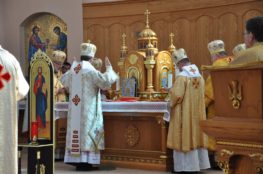Anton Shekhovtsov’s chapter, “By Cross and Sword: ‘Clerical Fascism’ in Interwar Western Ukraine,” published in the illuminating, albeit imperfect, volume Clerical Fascism in Interwar Europe (Routledge 2008), adds needed depth to understanding the role of the Ukrainian Greek Catholic Church (UGCC) in building the Ukrainian state, or at least an iteration of the Ukrainian state which did not survive the Second World War. The term “clerical fascism,” as Shekhovstov notes at the outset, is problematic, though he manages to settle on the following working definition: “[A]n authoritarian socio-political current, which emerges within clergy holding nationalist views, legitimizing and supporting fascisticised politics as a means of creating a state, in which religion’s authority, once forfeit, is expected to be revived, bringing order and earthly salvation to the nation.” Whether this definition—which Shekhovstov refers to as a “heuristic construction”—properly encompasses the full range of Greek Catholic clerical involvement in early 20th C. Ukrainian political life is questionable. Even more questionable is whether it can be meaningfully applied to other religious and national contexts, though that query can be dealt with at another time. Even if Shekhovstov’s definition holds for some aspect of 1920s/30s Ukrainian national realities, it is not immediately clear what should be thought of such realities today.
Without repeating the fascinating historical details Shekhovstov offers in his chapter, it is still possible to call out one of the central tensions between Ukrainian nationalism and Greek Catholicism, namely the former’s tendency to place the nation before God. This “pagan heresy” (as one Ukrainian churchman dubbed it) was checked by a form of “Christian nationalism” which, once infused with Christian ethics, could serve as a bulwark against the threat of communism emanating from Soviet Russia. As Shekhovstov explains, communism became, for both Ukrainian nationalists and UGCC clergy alike, a cosmic force to be eradicated. How powerfully opposed this-or-that Ukrainian nationalist movement or institution was to communism tended to provide some insight into how willing they were to bend the moral precepts of the Church, even to the point of calling for mass murder.
That noted, it would be wrong to view the UGCC’s role in Ukrainian politics as either decisively negative or contrary to Christianity. Ukrainian Catholic Action, for instance, undertook a social program of social and moral renewal in the light of the Catholic Church’s social magisterium. As for the form of Christian nationalism supported by many of the UGCC’s priests, its program lacks the menacing elements of the full-throated nationalistic and fascistic movements which, by the 1930s, had already come to dominate Central European affairs. Blessed Mykola Konrad, a professor at the Lviv Theological Academy, summarized the Ukrainian brand of Christian nationalism in this way (quoted by Shekhovstov):
This is the order of the 20th century: to bring a new, dynamic and enthusiastic elite together, and to let the conscientious and distinctive leaders direct it; to push masses to action, to a resolute and victorious struggle against the foul spirit of capitalism and Satanic communism for the sake of humankind’s renovation—personal, domestic, national and public—on the basis of Christian principles of justice and love[.]
The union of a religious ethos and the nationalist pathos is an unconquerable force! The cross and the sword—this is the hope of both nations and humankind for a new and better tomorrow, so Christ’s pax can ascend His worldly throne.
Oh God, let these two idealisms—the Catholic “I believe” and the nationalist “I will”—as the two clear tones of the Ukrainian soul, merge harmoniously into one accord and awake our withered hearts. And a new era of faith, love, and power—a mighty national unity and a unified invincible front—will come.
Today, outside of Ukraine, it would not be surprising to find many Catholics looking askance at such words, imbued as they often are with a liberal spirit that abhors identifying Christianity as anything more than a wellspring of metaphysical surety and existential comfort. Nationalism, for more understandable reasons, is foreign to the contemporary Western Catholic mind as well, for even the great “Catholic nations” of old Europe are a thing of the past. In America, where Catholics have only found a respectable place in political society after abandoning what it means to be Catholic in the three-dimensional sense Konrad’s statement captures, the nation or, more accurately, the state has already been prioritized over the Church and her head, Christ the Lord. The Ukrainian Catholic interwar political experience may have more to say to all of us than we’re currently prepared to hear.



